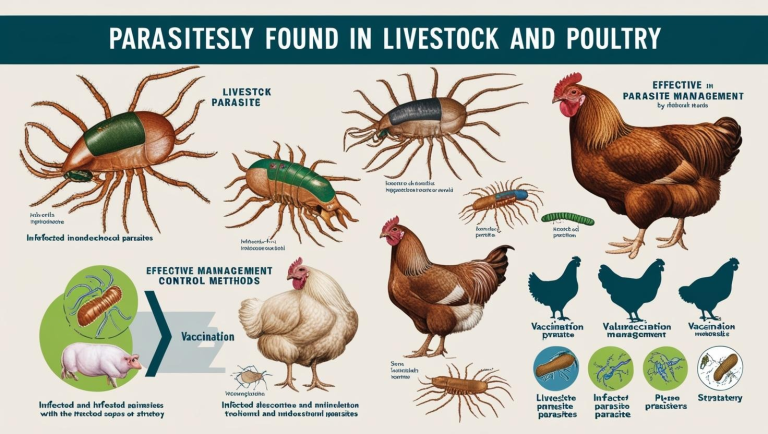Parasites are a major concern in livestock and poultry farming, affecting the health, productivity, and overall well-being of animals. They can cause a wide range of issues, from mild irritation to severe diseases, leading to economic losses due to reduced growth rates, poor feed conversion, lower milk or egg production, and even death in severe cases. Controlling parasites is essential for maintaining a healthy herd or flock and ensuring efficient farm operations.
This article explores the types of parasites affecting livestock and poultry, how to identify them, and the best strategies for prevention and control.
Click HERE to join our WhatsApp group
Types of Parasites in Livestock and Poultry
Parasites can be classified into two main categories: external parasites (ectoparasites) and internal parasites (endoparasites).
a. External Parasites (Ectoparasites)
These parasites live on the skin, feathers, or hair of animals and feed on blood, skin cells, or other bodily secretions. Common external parasites include:
1. Mites
Affect poultry, cattle, sheep, and goats.
Symptoms: Itching, feather loss (in poultry), skin irritation, and scabs.
Common species:
Scaly leg mites (Knemidocoptes mutans) in poultry cause thick, scaly deposits on legs.
Sarcoptic mange mites in pigs and cattle cause intense itching and skin lesions.
Psoroptic mange mites in sheep lead to wool loss and skin irritation.
READ ALSO: Feed Processing and Preservation Techniques
2. Lice
Affect cattle, poultry, pigs, and sheep.
Symptoms: Scratching, restlessness, reduced weight gain.
Common species:
Biting lice (feed on skin debris)
Sucking lice (feed on blood, causing anemia in severe cases)
3. Fleas
Primarily affect poultry and small ruminants.
Symptoms: Anemia, restlessness, skin irritation.
4. Ticks
Affect cattle, sheep, goats, and horses.
Symptoms: Swelling at bite sites, irritation, transmission of diseases like anaplasmosis, babesiosis, and theileriosis.
READ ALSO: Insect-based feed ingredients
5. Flies and Mosquitoes
Flies such as horn flies, stable flies, and botflies cause discomfort, blood loss, and transmit diseases.
Mosquitoes spread deadly diseases like avian malaria and West Nile virus.

b. Internal Parasites (Endoparasites)
These parasites live inside the body and primarily affect the digestive, respiratory, or circulatory systems.
1. Gastrointestinal Worms (Helminths)
Affect cattle, sheep, goats, pigs, and poultry.
Symptoms: Weight loss, diarrhea, anemia, poor feed conversion.
Common types:
Roundworms (Ascaris, Haemonchus, Ostertagia, Trichostrongylus, Strongyloides)
Tapeworms (Moniezia, Taenia species)
Lungworms (Dictyocaulus species)
READ ALSO: Biosecurity Measures in Livestock and Poultry Farming
2. Protozoan Parasites
Affect cattle, poultry, and small ruminants.
Symptoms: Diarrhea, dehydration, weight loss.
Common types:
Coccidia (Eimeria species) – Causes coccidiosis in poultry and livestock.
Cryptosporidium – Affects young calves, causing severe diarrhea.
Babesia – Causes babesiosis, a tick-borne disease in cattle.
3. Liver Flukes (Trematodes)
Fasciola hepatica is a common fluke affecting cattle, sheep, and goats.
Symptoms: Liver damage, weight loss, decreased milk production.
Identifying Parasite Infestation in Livestock and Poultry
Early detection of parasites helps in controlling infestations before they become severe. Common signs of parasite infestation include:
a. General Symptoms
Scratching, rubbing against objects, and excessive grooming.
Poor weight gain and reduced feed efficiency.
Lethargy and reduced activity.
Anemia (pale gums, weakness).
Diarrhea or constipation.
READ ALSO: Managing weaners and growers for maximum efficiency
b. Specific Symptoms Based on Parasite Type
External parasites: Hair loss, skin lesions, crusty or scaly skin, wounds from biting/scratching.
Internal parasites: Weight loss, bloating, diarrhea, rough coat, coughing (in case of lungworms).
Ticks and fly infestations: Visible parasites on the skin, swollen bite sites, secondary infections.
Farmers should conduct regular inspections, checking the skin, feces, and general behavior of animals.
Strategies for Parasite Control

a. Good Farm Management Practices
Proper Sanitation
Clean barns, coops, and pastures regularly to reduce parasite eggs and larvae.
Remove manure frequently to limit worm infestations.
Rotational Grazing
Move animals to different pastures periodically to prevent parasite build-up in soil.
Quarantine New Animals
New livestock should be kept in isolation for at least two weeks before introducing them to the herd or flock.
b. Chemical Control (Antiparasitic Treatments)
Deworming Programs
Use anthelmintics (dewormers) at recommended intervals.
Rotate dewormers to prevent drug resistance.
External Parasite Treatments
Apply acaricides (tick treatments) and insecticides on animals and housing.
Use medicated dips, sprays, and pour-on formulations for ectoparasite control.
c. Natural and Alternative Methods
Diatomaceous Earth
Used in poultry and livestock feed to help control internal parasites.
Herbal Remedies
Garlic, neem, and papaya seeds have shown effectiveness in controlling parasites.
Biological Control
Introducing beneficial organisms like predatory mites to control harmful mite populations.
d. Vaccination and Genetic Selection
Vaccines
Some parasites, such as coccidia, can be controlled through vaccination in poultry.
Breeding for Resistance
Selecting animals with natural resistance to parasites helps in long-term control.
READ ALSO: Nutrition guidance for pigs
Preventing Parasite Resistance to Medications
Overuse or misuse of antiparasitic drugs can lead to resistance, making treatments ineffective. To prevent this:
Use correct dosages and full treatment courses.
Rotate different classes of dewormers periodically.
Implement integrated parasite management strategies rather than relying solely on drugs.
Conclusion
Parasites are a significant threat to livestock and poultry health, but with proper identification and control measures, their impact can be minimized. A combination of good hygiene, strategic deworming, pasture management, and alternative treatments can effectively keep parasite populations under control. Farmers must remain vigilant, conduct regular checks, and adapt their management strategies to prevent infestations and maintain a healthy, productive farm.
READ ALSO: Leptospirosis in Pigs
Leptospirosis can be a serious reproductive disease of pigs that can also cause major (non-reproductive) illness in humans.
It causes abortion, stillborn and weak piglets, and deaths soon after birth…
READ ALSO: Vaccination and Disease Prevention Strategies
Vaccination is one of the most effective methods of preventing infectious diseases in livestock and poultry. It protects animals from deadly infections, reduces mortality, and enhances farm productivity. Implementing comprehensive disease prevention strategies ensures sustainable animal farming…
Click HERE to join our WhatsApp group

